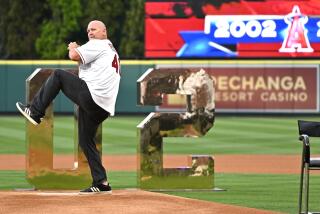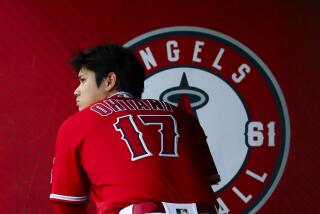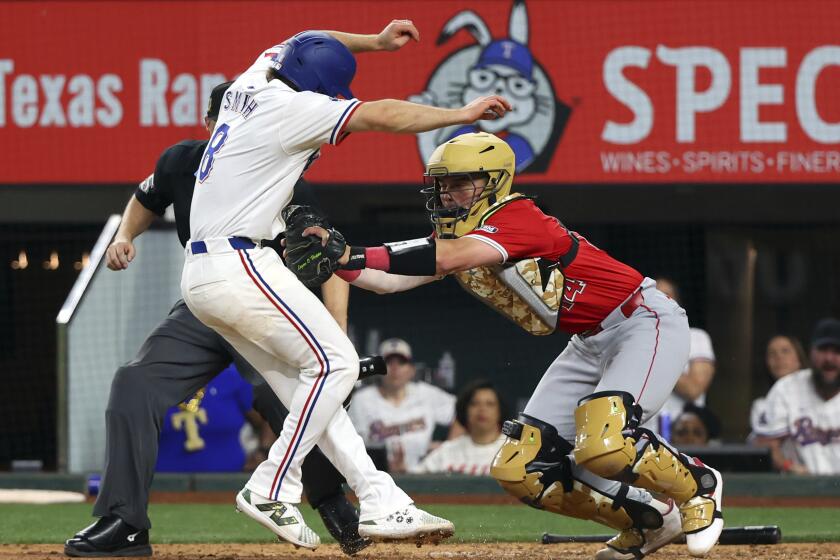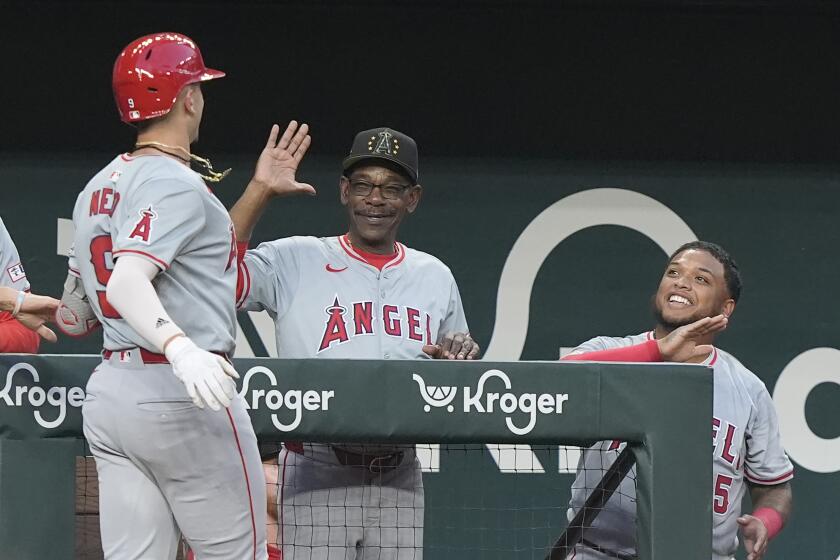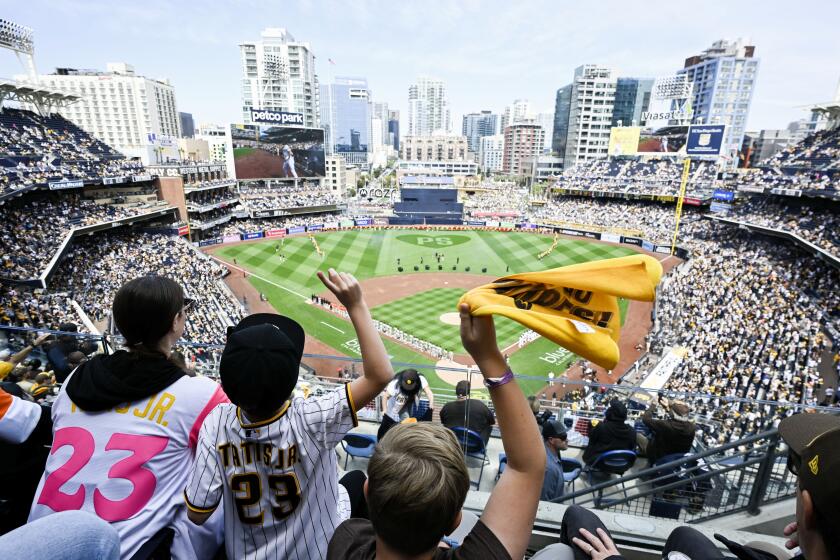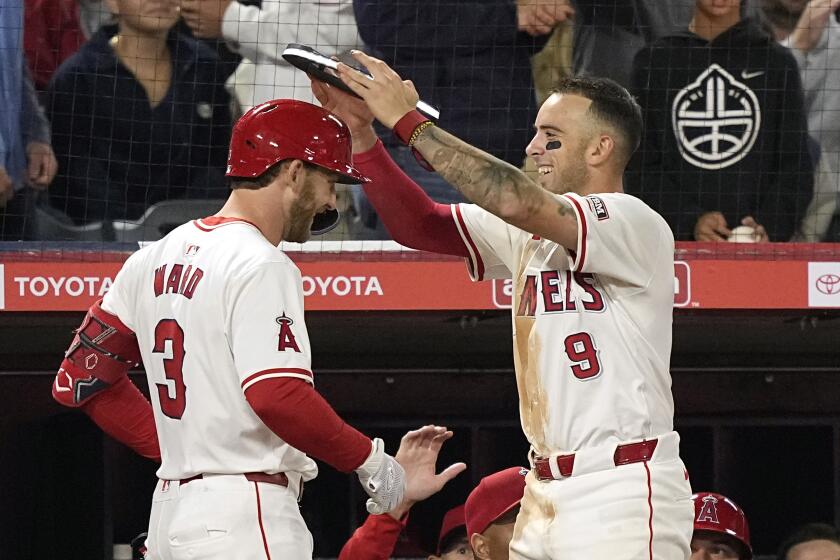Uneasy Lies the Kingdon
The Walt Disney Co. was silent Monday on reports that it might sell the Anaheim Angels, but that didn’t stop business analysts and sports experts from speculating on whether dumping the under-achieving baseball club--and maybe even its popular Mighty Ducks hockey team--would be a smart move.
Some Disney watchers were surprised when a high-ranking baseball official said Sunday that the company might consider shopping the team only five months after completing its purchase from the Autry family.
“Even at a high price, it’s not going to change [Disney’s] balance sheet significantly,” said Harold Vogel, a veteran New York stock analyst.
But others, especially those in the sports and media industries, question the Angels’ value to Disney after the company’s proposed ESPN West cable sports channel collapsed and the team, despite a record payroll investment, failed to produce a winner this season.
“Without a regional network, Disney no longer needs to own the [Angels],” one high-ranking television source said.
The sheer size of Disney’s investment in the Angels--more than $130 million to purchase the franchise and close to $100 million to renovate the stadium--makes it unlikely the company can recover its money with a quick sale. Forbes magazine recently estimated the franchise value at $195 million.
But, in three seasons under Disney management, the Angels claim operating losses of more than $42 million. With pressure on Disney Chairman Michael Eisner to reverse Disney’s slipping stock price, with the failure of the proposed cable sports channel, and with the Mighty Ducks losing money last season for the first time in franchise history, at least one source expects Disney also to consider selling its wildly successful hockey team.
Former baseball commissioner Peter Ueberroth, who led an investment group that was outbid by Disney when the Autrys sold the Angels, could again bid for the team if it becomes available. Ueberroth did not return calls Monday. Sources also said Michael Ovitz or Marvin Davis could be interested suitors if unsuccessful in luring an NFL franchise to Los Angeles.
In Denver, the NBA Nuggets, NHL Avalanche and new Pepsi Center arena recently were sold to Donald Sturm for $461 million. Disney could elect to sell both the Angels and the Ducks, but the city of Anaheim owns both Edison Field and the Arrowhead Pond of Anaheim. Anaheim Mayor Tom Daly said he had not heard from Disney officials Monday.
“I think they always felt the value of the [baseball] franchise was in synergy with its other holdings,” said Richard Brown, the former Angel president who negotiated the sale of the Angels to Disney on behalf of the Autry family.
“If Disney gets out of major league baseball, it will also get out of ice hockey. I can’t see them keeping one team but not the other.”
Say it ain’t so?
Eisner did just that, five months ago. In a spring training interview, he said he considered the Angels the one arm of the Disney empire without the potential to make money.
“The solution has always been to sell the team and make the money on the flip,” Eisner said. “That’s not what our business is about. The Disney Co. doesn’t do that.”
But Disney might simply be weary of professional sports teams leaving a disproportionately large stain upon the company. In 1997, Disney clashed with major league baseball over drug policy after the Angels’ Tony Phillips was arrested for cocaine possession, and Eisner himself bemoaned the boos he heard at the Arrowhead Pond of Anaheim when the Ducks and superstar Paul Kariya engaged in a contract stalemate.
While the Ducks have generated positive vibes with a playoff appearance last spring and Kariya’s peaceful signing to a three-year contract in June, the Angels have generated nothing but trouble during this last-place summer, including players objecting to a contract extension for Manager Terry Collins, endless rounds of teammates publicly criticizing each other, speculation over the future of General Manager Bill Bavasi and Hall of Fame coach Rod Carew suggesting the team “clean house.”
Vogel, the stock analyst, said Eisner cannot restore Disney to financial glory simply by selling the Angels. The fiscal losses in baseball count for little in a company that turned a $2-billion profit last year.
“It’s draining on their profitability, and they are in a cost-cutting mode,” Vogel said. “In any other situation, they would not even think about it. They’d hold on to it for the long run.
“It isn’t going to change the stock price to any great degree. It’s a tiny fraction of the total corporate assets.”
Media entities generally buy and hold teams, Vogel said, using them as programming for broadcast and cable channels as well as for promotional vehicles. Disney had planned to use the Angels and Ducks as the foundation for the proposed ESPN West cable channel, a would-be rival to Fox Sports West. After that venture collapsed last July, the ability to advertise Disney movies and television shows or distribute Disney merchandise at Angel games apparently was not nearly as prized.
“Maybe losing money is more important than the synergies,” said Ken Wachter, former vice president of sales and marketing for the Angels and Ducks. “I really thought they hoped to make money in baseball. I think it was a surprise to them when they didn’t.”
While regional networks like Fox Sports West can sign teams to long-term contracts, outright ownership assures that the programming won’t grow more expensive when the contract is up for renewal--or worse, won’t end up on the channel of a rival willing to extend a richer rights package. To guarantee programming for local cable and broadcast channels, Fox Group bought the Dodgers, while Cable giant Comcast Corp. owns the Philadelphia Flyers and 76ers, Tribune Co. owns superstation WGN and the Chicago Cubs, and Time Warner Inc. owns superstation TBS and the Atlanta Braves and Hawks. When the ESPN West project still was alive, Disney had expressed interest in buying stakes in the Clippers and the Lakers to secure its pool of programming. But ESPN abandoned the project after rival Fox bought the Dodgers, purchased stakes in the Lakers and Kings and wooed the Clippers and the Kings to the new Staples Center. The deals also secured Clipper and Laker broadcasts for Fox Sports West and Fox Sports West 2, dooming Disney’s proposed channel.
Disney’s stock price has slid dramatically over the last year, falling to $25.75 on Monday from a 52-week high of $38.69 a share, because of the poor performance of ABC and a slowdown in merchandise sales. “ESPN is the only thing holding up ABC, but we face the same restrictions and cost-cutting mandates as everyone else in the company,” said one source at the network. “These are desperate times at Disney, and Eisner is looking for any way to generate more money.”
Disney touted its legendary marketing wizardry as the key to revitalizing the Angels. The company did a splendid job of restoring Anaheim Stadium from an ugly, cavernous football stadium into a cozy ballpark and lured 2.5 million fans last season, the most since 1990.
Never, however, could Disney convert the passive fan into the passionate fan. Despite new, Disney-designed logos and uniforms, Angel merchandise ranks 22nd among the 30 major league teams. In contrast, Duck merchandise ranks among the best-selling in NHL history, and the Ducks have played to near-sellout crowds for all six seasons at the Arrowhead Pond of Anaheim.
“Baseball fans want baseball,” Wachter said. “Tim Salmon jersey night sells a lot better than Little Mermaid night.
“Baseball drives baseball, not the Disney magic.”
Disney officials could be frustrated by losses on the field and in the financial ledger. Bavasi and club president Tony Tavares persuaded Eisner to spend $80 million on free-agent first baseman Mo Vaughn and another $10 million on free-agent pitcher Tim Belcher, but the promised pennant contender failed to materialize. The inflated player payroll all but guaranteed that financial losses would continue, but Eisner did not consider breaking even with an inferior team was any victory.
“We have to be competitive,” Eisner said in spring training. “Our own pride demands it, and I don’t think our fans in Orange County would accept the Disney Co. not being competitive. . . . If we’re going to be on the field, we’re going to be on the field in a successful way.”
Said Brown: “It’s an extremely expensive proposition. When you get involved with people like Gene Autry, who get involved for the love of the game, they’re going to ride it out. When you get businesspeople involved, and the returns are not what you had projected, and the synergy is not what you expected it to be, it probably doesn’t fit their needs.”
Several experts questioned the timing of Disney’s business evaluations. Potential Angel buyers would be wary of purchasing a major league franchise in the absence of a new labor agreement; the old one extends through 2000 with an option for 2001. By that time, a second Disney theme park--California Adventure--will be open and funneling millions more people into Anaheim.
“The Walt Disney Co. is very concerned with competition for the entertainment dollar,” said David Carter of the Sports Business Group. “If another entity came to Anaheim, wouldn’t that be a competitor to their theme parks? Strategically, this may not be a great move for them.”
PaineWebber analyst Christopher Dixon said: “Disney has made a very real commitment to the Anaheim community to maintain and upgrade the entertainment opportunities in Anaheim, particularly those in close proximity to the theme park. The opportunity to go out and sell any of those assets has never been better.”
While Autry founded the Angels in 1960, the Mighty Ducks are a Disney creation, inspired by a movie of the same name and in turn inspiring more movies, a television show and caps and T-shirts worn across the United States, Canada and Europe. If Disney really is concerned about image, Carter suggests, the company should hold on to the Mighty Ducks.
“The Ducks are Disney,” Carter said. “The Angels are the perennial cellar-dwelling quagmire.”
(BEGIN TEXT OF INFOBOX / INFOGRAPHIC)
BY THE NUMBERS
14%: Decline in Disney stock price in 1999
40%: Decline in stock price since peak in 1998
$130 Mil.: Disney’s purchase price for Angels
$100 Mil.: Cost of renovation of Edison Field
$42 Mil.: Estimated Angel operating losses
22: Angel merchandise rank among 30 MLB teams
$6-9 Mil.: Estimated Duck losses last season
Times staff writers Sallie Hofmeister and Helene Elliott contributed to this report.
More to Read
Go beyond the scoreboard
Get the latest on L.A.'s teams in the daily Sports Report newsletter.
You may occasionally receive promotional content from the Los Angeles Times.
